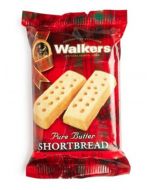Scottish Walker Butter Shortbread 40g x 24
INGREDIENTS: wheat flour, butter, sugar, salt
Weight: 40g x24 packs(each pack has 2 pieces of shortbread)
At one end of the road that runs through Aberlour, in Scotland, there is a distillery; at the other, a shortbread factory. In between lies a one-mile beat on the banks of the Spey on which Aberlour villagers can, for an annual sum of £100, fish for salmon. For some people, it is probably the closest thing to heaven on earth. Even discounting the presence of the biscuits and whisky (there are 30 other distilleries in the vicinity, including Glenfiddich and Macallan), this is an extraordinarily beautiful part of the country, and the Spey is one of the most famous rivers in the world and has hosted a roster of celebrity fly-fishers, including the late Queen Elizabeth the Queen Mother and Princess Margaret.
It is also home to Jim Walker, who, with his brother, Joseph, and sister, Marjorie (now retired), owns the shortbread. He is a grandson of the Joseph who founded Walkers shortbread in 1898, borrowing £50 and setting up a bakery in Aberdeen. In 1910 Joseph moved his bakery to Aberlour and opened a shop on the high street. The shop is still there, exactly as it was in the 1950s, but the bakery has grown exponentially and now occupies a 15-acre site just outside the village, producing cakes, meringues and mince pies as well as the 40,000 tons of shortbread biscuits the company makes each year, which are exported to more than 90 countries, including America, Japan and Australia.
It is a big achievement for what is still a family-owned and -run firm. ‘Speyside is the perfect home for a shortbread company,’ Jim Walker says. ‘Even the Scottish climate helps. You can’t make shortbread in a heatwave, which is not a danger here. You couldn’t do this in London.’
As you may expect from a man who seems never to be more than arm’s length from a plate of biscuits, Walker is one of the most benign and charming factory owners you could hope to meet. More Wallace than Bounderby, he provides a background commentary on the life and times of Walkers; shortbread; the vote; fly-fishing; Harry Lauder, who was a friend of his grandfather’s; the railway, axed by Beeching, that once ran through Aberlour, taking whisky southwards; and the day he took a suitcase of shortbread up to Harrods in the 1960s and sold the lot – all discussed in a soft Scottish burr as he shows me around his fiefdom.
Walkers still makes shortbread for Harrods, and its own line is sold through Waitrose, Ocado, airports and high- end stores such as Fortnum’s and Selfridges. It is not in any other supermarket – an astonishing fact considering that the brand exerts such a hold on the public imagination. If you think of shop-bought shortbread, you pretty much think of Walkers in its familiar tartan boxes decorated with Scottish iconography of thistles, lochs, stags and castles. ‘That all works really well in America,’ Walker notes. He is particularly proud of the company logo, a 19th-century portrait of Flora MacDonald enjoying a romantic encounter with Bonnie Prince Charlie, which has been used on the packaging for 45 years. (The original picture, by William Joy, came up at Sotheby’s in 1998. It was bought by Walker and now hangs in Aberlour House, the company’s headquarters, where we adjourn before setting off to visit Shortbread 2, the factory that produces all Walkers shortbread.)
Legend has it that the original Aberlour House gave shelter to the prince when he fled to Skye in 1746. In its current 19th-century pillared incarnation it has housed, among others, the MoD during the Second World War, while they planned the D-Day landings; and the pre-school for Gordonstoun, when it was bitterly cold and stank, according to the Prince of Wales, of old socks.
‘That’s the thing everyone who knew it when it was a school mentions when they come here,’ Walker says. ‘ “Good heavens, it's warm,” they say. “It used to be so cold.” ’ The house itself is massive. There are endless corridors sporting tartan carpets and gigantic rooms where Field Marshal Montgomery pored over his maps and several hundred schoolboys swarmed, but which are now stuffed with shortbread biscuits and Walker-family memorabilia – portraits of Walker’s father and uncle, who kept the company going through two world wars; cabinets full of awards and presents donated by grateful distributors; the desk at which Walker can remember watching his grandfather count the money at the end of each day; and a large fibreglass tartan elephant that guards the bottom of an impressive staircase in the front hall.
Sadly the family does not actually live here (‘Not my style at all,’ Walker murmurs); instead it provides conference and sales rooms, plus space for 40 office staff – and those biscuits. If you are an office worker who fancies a shortbread with your cup of tea, Aberlour House is the place to be. There are more than 300 different types of Walkers shortbread, and there are boxes of every one of them here in the sales room.
‘Shortbread means “crumbly”,’ Alistair Gronbach, Walkers’ mar-keting director, says as we gaze at half a mile of table laden with it. ‘It was invented by adding butter and sugar to stale breadcrumbs and baking the result. It was a delicacy and one that we owe to Mary, Queen of Scots, who came back to Scotland from France with a host of French chefs. They made it for her, originally baking it in rounds – petites galettes – decorated like the petticoat tails of the queen.

